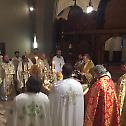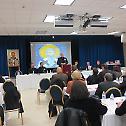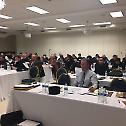First Assembly under Leadership of Bishop Irinej
Despite snow storms and chaotic travel, clergy and representatives from parishes and their church-school congregations across the Eastern American Diocese came together in Boston February 10-11, 2017 for their first Diocesan Assembly under their recently-enthroned hierarch, Bishop Irinej.
The Assembly was graciously hosted by Cathedral Dean, Protopresbyter-Stavrophor Aleksandar Vlajkovic and the faithful of St. Sava Cathedral in Cambridge. St. Sava's was recently elevated to the dignity of a cathedral by His Grace Bishop Irinej.
The Annual Assembly of the Diocese brings together all Diocesan clergy, congregation board presidents and representatives around their Bishop and Archpastor for prayer, learning opportunities and reports on activities and status of the Diocese, diocesan entities and parishes over the past year and plans for the coming year. Its purpose is to strengthen ties between parishes and between parishes and their Bishop, and to foster communication and cooperation among the Bishop, the Diocese and the parishes towards common goals.
The Diocesan Council met earlier on that Friday afternoon to propose the final agenda for the Assembly, to finalize a budget proposal for the coming year for the Assembly's consideration, and to discuss various matters concerning certain parishes. Legal and tax registrations of the Diocese necessitated by the move to New York and the need to clearly coordinate and standardize these registrations, web domains an protect intellectual property throughout the entire Serbian Orthodox Church in North and South America was also discussed and will be further investigated.
After the arrival and registration of Assembly participants, the Assembly began with the serving of Vespers and the solemn Invocation of the Holy Spirit, during which all those present prayed that their work would be blessed and guided by the Holy Spirit to the glory of God, the building up of His Kingdom, and the welfare of His Holy Church.
Following dinner, the first session of the Assembly began with the singing of the Troparion of Pentecost, the Feast of the Descent of the Holy Spirit upon the Apostles and an invocation by Bishop Irinej. The Rev. Dr. Rodney Torbic was appointed secretary of the Assembly. Fr. Rajko Kosic reported for the Credentials Committee that, in addition to Bishop Irinej, there were 36 priests, two deacons, 17 congregation board presidents, 16 congregation delegates and 3 observers present. The Assembly was gratified that, despite the weather and resulting travel difficulties, a large number of parishes were represented by a good number of both clergy and lay delegates. The following day, gratefully, saw the arrival of more clergy and delegates, whose flights had been previously cancelled.
His Grace Bishop Irinej then addressed the Assembly. He thanked everyone for the tremendous welcome he has received, both at his enthronement in October and in his many visits to parishes around the Diocese. He discussed his impressions of the Diocese and its people, and his hopes and plans for the future as he works together with the Diocesan Council and the clergy and parishioners to lead the Diocese into the next chapter of its existence. He recalled all his predecessors on the episcopal cathedra of the Diocese and the foundations that they have laid for us to continue to build upon. His Grace then intoned the singing of Memory Eternal for all departed hierarchs, clergy, monastics and faithful who were participants of past Diocesan Assemblies.
His Grace spoke of the tremendous task of rebuilding the Cathedral Church of St. Sava in New York City following the disastrous fire on Pascha of last year, and the need for establishing a functional and suitable Diocesan Center there to represent the Serbian Orthodox Church in that great city. He was pleased to announce that His Royal Highness Crown Prince Alexander of Serbia has agreed to be Royal Patron of the rebuilding project, and he called on all members of the Diocese and on all Orthodox Christians world-wide to support this great effort. He also reminded the Assembly of his vision, expressed already at his enthronement, to build a Serbian Orthodox Cathedral Church in Washington, D.C. to be a witness to Serbian Orthodoxy and a suitable presence in the Nation's Capital.
The Bishop called upon the Assembly to publicly thank the retiring Protopresbyter-Stavrophor Dragoljub C. Malich for his many years of faithful service to the Diocese and Serbian Orthodox Church as a pastor, Diocesan and Central Council member, leader of relief work, and Episcopal Deputy. He also asked the Assembly to thank Protopresbyter-Stavrophor Dr. Rodney Torbic, who is retiring from his many years of service as the Diocesan Director of Religious Education. They were given a rousing ovation in recognition of their outstanding work and faithful, self-sacrificial service. He also introduced the newly-appointed Episcopal Deputy, Protopresbyter-Stavrophor Dr. Zivojin Jakovljevic, Dean of St. Sava Cathedral in New York City, to the Assembly.
Following Bishop Irinej's message, Mr. Stephen Kracinovsky presented the 2016 Diocesan Financial Report, and Mr. Milan Visnick presented the Auditor's Report, which found all records and accounts in good order. Mr. Visnick thanked Diocesan Treasurer, Stephen Kracinovsky, and especially Diocesan Financial Secretary, Fr. Branislav Golic, for their good work in managing and maintaining the Diocese's financial accounts. Following a detailed introduction on the proposed Budget for 2017, reflecting on accommodating new Diocesan positions and projects, by Diocesan Council Vice President, Mr. Milan Mrkalj, the proposed 2017 Diocesan Budget was proposed by Mr. Kracinovsky. The same was well-received and approved by the Assembly.
Fr. Milan Pajic, Director of the Shadeland St. Sava Camp program, presented a report on the camp's activities last year. Reports were also presented on behalf of Fr. Mijoljub Matic on St. Mark’s Camp in Sheffield Lake, Ohio and by Fr. Miladin Blagojevic on the Winter Camp held in Atlanta, Georgia, as sponsored by the St. Petersburg Deanery each Christmas break. The reports and proposed budgets were approved. His Grace Bishop Irinej noted that the Diocesan Council is planning to establish Shadeland St. Sava Camp as a year-round retreat center through necessary building projects and improvements, and allocating funding for the same. This proposal was received and approved by consensus.
Fr. Rodney Torbic, retiring Diocesan Director of Religious Education presented his final report as director and was sincerely thanked once again. His Grace then introduced the new Diocesan Director of Religious Education, the Rev. Deacon Dr. Jovan Anicic. After many years of discussion and felt need, His Grace has appointed Deacon Jovan as our first full-time education director, as well as interim diocesan deacon to the bishop. He comes to us with much training and experience as an educator, lecturer in Theology and expert in Serbian and Byzantine liturgical chant. Deacon Jovan offered a power-point presentation to the Assembly on principles and needs of Christian Education and discussed some of his plans for the future. He was enthusiastically welcomed by the Assembly.
As the final order of business on Friday evening, the outgoing Diocesan Council members were thanked for their three years of service, and the following were elected for the coming three-year term: Milan Mrkalj, vice-president; Fr. Rade Merick, secretary; Steven Kracinovsky, treasurer; Fr. Branislav Golic, financial secretary; and members Fr. Aleksandar Vlajkovic, Fr. Dragan Zaric (FL); Mark Rasevic, Nada K. Sizemore, Rudley Mrvos, Stan Brozik, and Milan Visnick. Alternates are Fr. Christopher Rocknage, John Simic and Sonia Janson. They join His Grace Bishop Irinej, who is Council President ex officio, and Fr. Zivojin Jakovljevic, who is a member of the Council ex officio as Episcopal Deputy. Audit Board members elected were Andy Muha, Marty West and George Mirich.
The second and final day of the Assembly began with the Hierarchical Divine Liturgy at 8:00 AM. The Liturgy is the highlight of every Assembly, and indeed of all of Christian life, as we enter into the Kingdom of God and partake of the Heavenly Banquet at which our Lord Jesus Christ is both the Host and the content of the Feast, the Offerer and the Offered. As the clergy and faithful gathered around their Bishop and Archpastor, they became the Church of Christ in its fullness, enlivened by partaking of the Body and Blood of Christ in the Holy Eucharist, in which they truly became His living Body. Gratefully, a large number of those present enabled and confirmed this unity in Christ through receiving the Holy Mysteries. His Grace Bishop Irinej offered words of hope and encouragement, reflecting on the true meaning of an Assembly in which there are no delegates, rather all are members of a sacred gathering as Church. Speaking first in Serbian on the patristic understanding of a sacred community perfected in the love of Christ and then, in English on the message of the Church's weeks of preparation before the Great Fast and the journey, which both begins and culminates in our desire to be one with Christ, leading us from this holy gathering, through the Cross and the Tomb of Christ to His – and through Him our – glorious Resurrection.
Following the Divine Liturgy and breakfast, the Assembly heard two deep and meaningful presentations from two eminent Orthodox Christian scholars and thinkers on the topic of Our Orthodox Public Witness. The first presentation was by Dr. Aristotle Papanikolaou, Professor of Theology, holder of the Archbishop Demetrios Chair in Orthodox Theology and Culture, and Co-founding Director of the Orthodox Christian Studies Center at Fordham University in New York. He is also Senior Fellow at the Emory University Center for the Study of Law and Religion. He also is a co-manager of the well-known blog Public Orthodoxy, which presents op-ed style articles on current events and controversies in the Orthodox world from a variety of respected experts. Dr. Papanikolaou's talk entitled Why be Orthodox? targeted the phenomenon of the Millennial Generation and the “Nones”, those who profess no particular religious affiliation, but who often say “I'm spiritual, but not religious.” In his talk, Professor Papanikolaou showed how cultural shifts and movements require the Church to approach younger people today in a meaningful and persuasive way. Dogma is not accepted at face value, but must be shown to be both true and meaningful. The Church must first meet people where they are, on their terms, in order to be able to lead them into a deeper discovery of Christian truth and life. He said that this requires us to beware of any kind of fundamentalism, or the “cultural warrior” mode. This does not mean changing or disregarding the truths of the faith, but presenting the faith on its own terms, and not in a strident or condemnatory manner simply as opposition to societal trends. He offered a number of suggestions how this could be more successfully done by the Orthodox in America.
The second presentation was by Dr. Elizabeth H. Prodromou, Visiting Associate Professor of Conflict Resolution at the Fletcher School of Law and Diplomacy at Tufts University and a Senior Fellow in National Security and International Policy at the Center for American Progress in Washington, DC. She has previously served as Vice-Chair and Commissioner on the U.S Commission on International Religious Freedom and as a member of the U.S Secretary of State's Religion and Foreign Policy Working Group, and has advised various international and non-governmental organizations on international religious freedom. Her talk, entitled Our Orthodox Public Witness: Some Thoughts on Current Issues on the Church Transforming the World, largely dealt with her experiences and impressions derived from being one of only four Orthodox women to be official participants in the Holy and Great Council of the Orthodox Church held in Crete last June. She described how her initial doubts about the need for some of the topics discussed at the Council were dispelled as the discussions took place. The frank and open discussions among the bishops gathered there led to a greater awareness of and appreciation for the actual world and life situations their brother bishops faced in other places, cultures and circumstances. In this process of self-discovery, the council fathers saw new and varied ways the Church could be, following the example of St. Paul, “all things to all men that by all means I might save some” (I Cor. 9:22). By encountering the world as it is, the Church can indeed “transform the world” by bringing the saving and healing power of Christ to bear in every situation.
Both presentations were well received by the members of the Assembly augmented by many members of the local parish. It was regrettable that due to time constraints and travel schedules more time could not be spent in discussion.
The next working session of the Assembly discussed the need for a coordinated approach to property insurance for the Diocese and its parishes by forming a Serbian Group Affiliation Program (GAP). A presentation was received from Mr. Michael Herzak of Insurance Systems Group. Mr. Herzak is an active Orthodox Christian whose insurance agency provides group protection to both the Orthodox Church in America and the Antiochian Orthodox Christian Archdiocese. His presentation highlighted the need and importance of adequate property insurance coverage, especially for Orthodox churches which typically have valuable church buildings, furnishings and iconography, as well as ongoing personal liability insurance for the clergy. Entering into a group insurance plan for the Diocese and its parishes could result in significant savings and better coverage. Each parish would be offered custom coverage, and participation would be voluntary. Many Assembly members expressed interest in the proposal, and it was decided by consensus that the Diocese should pursue such a program to ensure that all diocesan and parish properties, as well as its clergy are adequately covered.
His Grace then gave an update on the situation at St. Sava Cathedral in New York City, which was severely damaged by fire last Pascha. The walls of the church are in good condition, although the interior was completely gutted. While insurance covered part of the loss, much more will be needed to bring the complex back to full functionality. The present plan is to rebuild the church with the exterior largely as it was in its Gothic Revival Style, with the interior completed in Byzantine style, reminiscent of two prominent Serbian monasteries, Dechani and Gradac, which represent a harmonious synthesis of East and West. A parish hall would be accommodated in a completely remodeled cathedral basement, replete with columns and a vaulted ceiling. Since the Diocesan Bishop is by rule to reside in the capital or largest city in the Diocese, it was the consensus of the Assembly that the existing parish hall should be remodeled to become the new Diocesan Center. Work with architects and engineers will be taking place to realize these plans.
The Assembly's business having been completed, the meeting was closed with the hymn of St. Sava. Deepest appreciation were expressed to Fr. Aleksandar Vlajkovic and the board and parishioners of St. Sava Cathedral for their kind and generous hospitality.
Fr Rade Merick, Diocesan Council Secretary
Source: easterndiocese.org





